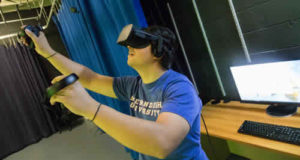In a technology lab at Shenandoah University in Virginia, students battle monsters, partake in lunar landings, experience a Civil Rights-era sit-in, and play soccer in rocket-powered cars.
The Shenandoah Center for Immersive Learning (SCiL) lab is the university’s tech hub and the home of the school’s virtual reality and esports programs.
Preparing tomorrow’s leaders
Starting in 2019, Shenandoah will be one of the first schools in the country to offer degrees in both these programs: a Bachelor of Arts and a Bachelor of Science in virtual reality/augmented reality (AR/VR) design and a Bachelor of Science in esports.
These majors position Shenandoah students to take advantage of the next big tech boom.
“The new VR and esports majors join cybersecurity, data science, and computer science in our growing list of technology-focused programs,” says Provost Adrienne Bloss, Ph.D. “The synergies among these programs reflect the tremendous impact of technology in our lives and prepare students to be leaders in some of the fastest-growing industries in the world.”
Creating an immersive, hands-on VR program
Shenandoah recently partnered with Irish software firm Immersive VR Education. The company’s Engage platform helps educators build their own custom VR content.
Through Engage, Shenandoah students will build virtual worlds and scenes simulating life experiences. The result will be five-minute immersive training experiences for real-world clients nationwide. These training videos will aid businesses, law enforcement, and emergency medical services in everything from suicide prevention to communicating with patients with dementia. Shenandoah students will not only build the VR scenarios, but they will also be able to star as role players in the experiences.
“Engage is going to move us so far beyond our brick and mortar here at Shenandoah,” says J.J. Ruscella, M.F.A., SCiL executive director and associate professor of theatre. “We’re going to have the ability to help companies and entities nationwide. Rapid training and retraining of individuals is becoming essential. It’s important to be able to efficiently and cost-effectively train employees in the newest and best practices.”
Shenandoah currently explores the human element within VR by tapping into storytelling and emotion. One of the ways the school does this is by using Shenandoah Conservatory acting students to serve as role players for VR videos.
Students, in collaboration with Shenandoah University’s history department and outside organizations, have recreated a 1960s Civil Rights-era lunch counter sit-in and the trial of pre-Civil War abolitionist John Brown using 360-degree VR video. They will also undertake a fully immersive VR project this spring. Through the Immersive VR Education partnership, students will build a virtual Independence Hall. Shenandoah history students and debate team members will then become avatars of the Founding Fathers to debate on a virtual stage within a re-creation of the 1787 Constitutional Convention.
Building careers in esports
The new Bachelor of Science in esports not only provides a general esports education, but also offers three tracks that students can choose from: esports management, esports coaching, and esports media and communication.
Shenandoah will also offer a minor in esports management, along with a minor and an online certificate in esports sports science.
Through the major, students can learn about esports consumerism, how to run an esports event, performance and physical training in esports, streaming esports, and coaching esports teams.
The esports industry is growing and is projected to be valued at $1.4 billion by 2020.
“The esports industry is one of the fastest-growing segments of the commercial entertainment industry and stands to become a billion-dollar industry by 2020,” says Joey Gawrysiak, Ph.D., associate professor and director of sport management and esports. “We are working to prepare students to enter this field as highly qualified individuals with a unique bachelor’s degree that will place them ahead of other people wishing to enter the field.”
Shenandoah’s varsity esports team, which started competition this year through the National Association of Collegiate Esports and will be separate from the major, has 30 team members playing five esports games, including Rocket League and Overwatch. Gawrysiak is currently recruiting for a varsity-level VR esports competition team.
- 8 top trends in higher education to watch in 2024 - April 16, 2024
- Defining a path to equitable AI in higher education - April 12, 2024
- Leveraging AI-driven edtech for continuous improvement in higher ed - April 11, 2024

